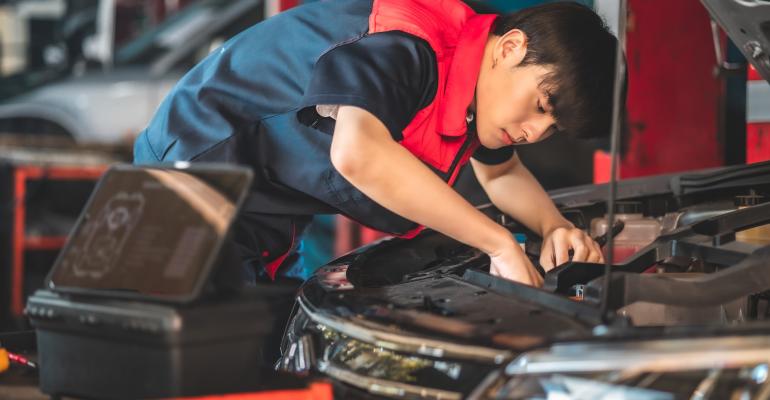Getting personal is the best tool for recruiting service technicians, says a successful senior fixed ops director.
Six years ago, Don Monda worked with a local technical college to establish an automotive service technician apprenticeship program. It was prescient. As Wards has reported, the retail auto industry faces a significant tech shortage today. Monda’s apprenticeship program helps dealerships, including The Proctor Dealerships, fill tech vacancies.
“We are directly involved with schools and colleges” that have tech training programs, says Monda, who currently has 10 apprentices working at Proctor dealerships, where he is the senior fixed operations director. He hopes two can fill vacancies at the company’s Acura store.
Monda promotes the automotive industry as a career at trade fairs and through local high school programs. That kind of personal involvement is what dealerships need to help fill the growing shortage of automotive service technicians, Monda tells Wards.
“The most important thing you can invest is your time in partnering with the high schools and whatever technical colleges are in your area,” he advises dealers looking for service technicians.
The Proctor Dealerships in Tallahassee, FL, include Honda, Acura and Subaru franchises. In general, the dealerships are in good shape regarding service technicians. The two vacancies are because of a retirement and a tech leaving the industry, says Monda.
But for the industry overall, the supply of service technicians has shrunk, especially in the past seven to 10 years, says Monda, who joined The Proctor Dealerships in 1992 as a service manager.
“The tech pool is drying up,” he says. “You don’t have the younger generation involved or even engaged enough to ask to look for a career in the auto industry.”
Creating that engagement must begin as early as high school, says Monda, who was instrumental in starting automotive shop classes at two high schools in the Tallahassee area. He also just persuaded a high school to add a welding shop.
Monda, who is on the advisory committee of the automotive service technology program at Lively Technical College in Tallahassee, says the idea to get high schools involved came to him when the apprenticeship program launched in 2017. “The light bulb went off,” he says. “We need to start in high schools.”
Two area high schools have a dual-enrollment program that allows students in their senior year who have completed all their electives to transfer to the technical college to finish their high school credits while simultaneously starting the automotive service technology program at Lively.
It is usually a two-year program, but through dual enrollment, students can complete it in 14 to 16 months and earn associates' degrees, says Monda. “We are really pushing with the technical colleges,” he says.
The Proctor Dealerships promote its partnership with the Florida Department of Education’s registered apprenticeship grant program on its website. The program pays tuition at Lively Technical College while a student works as a paid apprentice.
The dealership group is engaged with the local community, including raising money for a local hospice program and a cancer center and hosting an event for the humane society.
That helps raise awareness about the group’s corporate culture in general, says Monda, and corporate culture is more important than ever as dealerships try to attract millennials to work as service technicians.
They want more work-life balance, including more time off, he says.
That’s a big change from when he started in automotive retail, says Monda. “Retail in my day was open all the time.”
Monda is now talking with The Proctor Dealerships owners about changes such as a four-day work week.
Monda says he tells his bosses that younger people are going to work in jobs for the state or the country instead of a dealership because of the benefits including shorter working hours. “We have to compete with that, whether we like it or not,” he says. “Millennials aren’t about money.”
But the most critical recruiting tool is personal involvement–-getting out there and talking up a career in automotive retail, which includes fixed ops, says Monda.
“If we are going to survive, we have to be proactive,” he says.
Monda requires his managers to spend at least an hour a week talking to students about a career in automotive retail, and he encourages them to take an apprentice along with them.
Dealers “have to get engaged with local high schools and technical colleges and go to trade fairs. You have to get out there and talk about what your dealership has to offer in terms of careers,” he says.





